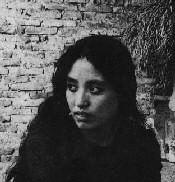Zhai Yongming

Zhai Yongming
Turn out all the lights and close all the curtains! Although her name means “eternal light”, Zhai Yongming is primarily a poet of inner psychological darkness and the best way to read her is in utter gloom. At the heart of Zhai Yongming’s poetry is a certain idea of femininity. In a statement made in 1986, Zhai declared that she wished to be a poet rather than a poetess, but that in her life she was first and foremost a woman. According to traditional Chinese thought, the feminine or yin principle is characterized by darkness, water and the spectral light of the moon. All these images are on prominent display in Zhai’s work.
Like most of the leading poets in the contemporary Chinese poetry, Zhai’s life is mixed up with the cataclysmic events of the Cultural Revolution (1966-1976). For two years as a teenager, she was sent away from her native urban environment in Chengdu, Sichuan province to “learn from peasants” in the countryside by doing manual labour. With her return to the city in the 1976, she devoted much of her energy to writing poetry, inspired by the breakthroughs that were taking place in literature in the early post-Mao period. She also studied in the Laser Technology Department of the Chengdu Institute for Telecommunications and Engineering, graduating in 1981.
Her commitment to the expression of a feminine quality in poetry was given extensive realization in the poem sequence Nüren (Woman), a linked suite of 19 poems published in 1984. According to the critic Tao Naikan, the sequence is characterized by “images of yin and is pervaded by its mystical darkness. . . . the poet looks for a feminine archetype in herself and her times, and tries to understand it further by expanding her own self to fuse with a universal image of woman”. Tao also provides a translation of one of the poems, “The World”, of which the following is a brief extract:
The waves beat against me
like a midwife patting my back, and so
the world invades my body
starling me bewildering me, letting me feel a certain ecstasy
On the one hand, there is an explicit attempt to fill her work with maternal and feminine signs, but on the other there are strongly personal and individualistic elements in Zhai’s work. In the mid-1980s, she claimed that the American confessional poets such as Sylvia Plath were significant influences on her work. Indeed, revelation of an inner psychological “darkness” to the bright light of shared language seems to be the pattern of many of her poems. This clash between the private and the public give rise to a marked hermeticism that makes her work extremely challenging. She admits this difficult in a short essay entitled “For the Vast Minority”:
However, on some occasions, when the particulars in a poem flow and permeate, language is monstrously exaggerated, expressing an uncertainty about the system, a dislocation of the existing language. When this happens, you have no choice but to respect the implications organized by this language, a language that goes beyond what you are capable of thinking. It’s just like music: when the music flows inside you, it awakes your limbs and every bone in your body, contorting your rigid and shrunken torso, but this does not mean that you have to love the performance and style of any specific musician.
For this reason, the translation of Zhai’s poetry is, quite literally, a nightmare. Unusual imagery and unpredictable connections make it next to impossible to always follow Zhai’s train of feeling. But something of the confronting, sombre mood of her work is, I hoped, conveyed indirectly by these tentative English versions.
I would like to thank Yenney Lai for all her help with these translations – her advice and insights have been invaluable.
Bibliography
Nüren (Woman) (poems, 1988)
Zai yiqie meigui zhi shang (Above all the roses) (poems, 1989)
Zhai Yongming shiji (Selected poems) (poems, 1994)
Cheng zhi wei yiqie (Call it everything) (poems, 1996)
Heiye li de su ge (Plain songs at night) (poems, 1997)
Links
In English
Review on Rattle.com: THE CHANGING ROOM by Zhai Yongming, translation by Andrea Lingenfelter
Versopolis: Selected best Chinese poems and translations. (With video)
Sponsors
























